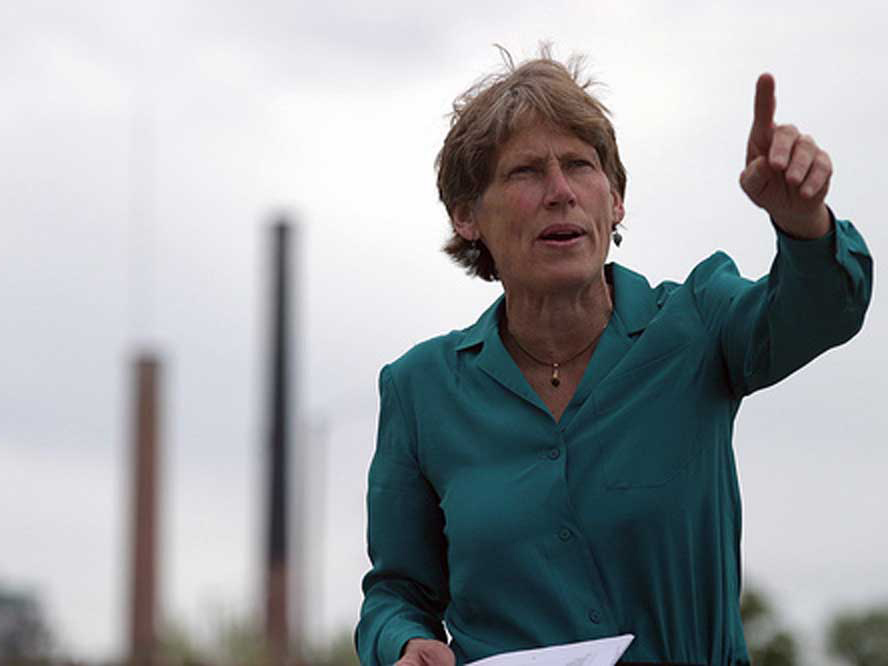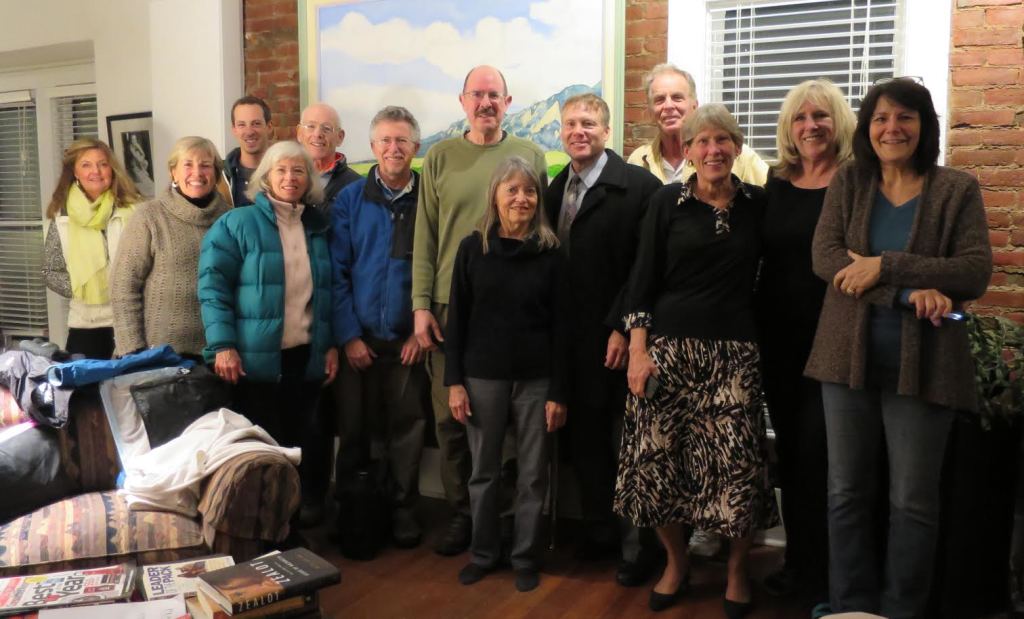
Leslie Glustrom speaking in front of the local Boulder coal plant about the need to move beyond coal in 2007. (Courtesy Leslie Glustrom)
Leslie Glustrom recently turned 60, but she’s no where near finished working on her life’s mission to fight climate change.
Throughout her career, Glustrom has been a science writer, teacher, and worked on public lands issues in Arizona in the 1990’s. Ten years ago, she left her job as a biochemistry researcher at Colorado University to devote herself full-time to educating her Boulder community about the dangers of coal-fired power plants – which accounts for approximately 40 percent of U.S. greenhouse gas emissions.
This Saturday, she will be speaking at the Colorado Climate Summit to help inspire people across the country to make a difference in their environment.
“We need as citizens to understand our end of the meter,” says Glustrom. “We are going to talk about how people can work with their local governments to keep the pressure on the utilities to move beyond fossil fuels and move towards the solar era.”
The long-time scientist explains her innate desire to preserve the environment developed around age 6 – after seeing a Monarch butterfly for the first time. She says as an older adult, she not only appreciates nature, she now worries about the negative impact humans are having on it. For example, she mentions the farmers in Bolivia who are forced to migrate from their barren land as climate change disrupts weather patterns there.
“I will probably never know those farmers, or the victims of the typhoon in the Philippines…I might never see a polar bear in real life, but when I see those polar bears with no ice to be seen, and its 200 miles to the next ice flow, I’m going to feel it,” says Glustrom. “I have a moral obligation to do everything I can – even if I don’t have grandchildren.”
When Colorado’s largest utility company decided to build a coal-fired power plant, Comanche 3 in Pueblo, CO, in 2005, her same sense of moral urgency is what led her, and two others, to form the nonprofit Clean Energy Action.
“If you care about humans and species, and if you recognize that connection between suffering and our energy choices, then what you want to do is stop pumping the atmosphere with carbon dioxide and methane,” says Glustrom. “That’s a big task but somebody’s got to start.”
She says around the same time, President Bush had sent a signal to the utility industry that it was okay to build coal plants, and there were more than 150 coal plants commissioned – each of which would last at least 60 years.
“People like me said, ‘Excuse me!,” says Glustrom. “Our vision is we want clean energy, and we’re willing to act to bring about the clean energy future.”
She says of all of those 150 proposed coal plants, 150 were stopped – thanks to the tireless work of Clean Energy Action and other environmental groups like The Sierra Club.
“We won many, many battles. It’s an outstanding accomplishment,” says Glustrom, only saddened they couldn’t stop the plant in Colorado.
She says she is also proud of a realization she had in 2008, when President Obama was running for his first election.
“Obama said, ‘Coal is what makes this country great, we’ll just make coal clean’…the Natural Resources Defense Council and Environmental Defense Fund said, ‘We’ll just make coal clean,’ a lot of environmental groups were saying, ‘We’ll just make coal clean,’” remembers Glustrom. “‘Clean coal’ is a dirty lie…you can’t make coal clean.”
The biochemist explains you can’t make carbon dioxide go away, and you can’t create or destroy matter.
“We gathered the documentation, did conferences,” says Glustrom about how she and her team tried to educate the masses about the reality of coal plants. “I predicted a lot of things that are happening right now. It’s something I’m proud of having figured out, but it’s something I’m deeply concerned about. We have to get our country repowered.”
The activist says that currently large utilities have a lot of financial power within the government, but not in the local level. She says the one place regular citizens can have an impact is working at the local level and educating local officials.
“Have them accept responsibility and recognize the moral responsibility we have. In that way, we can make great progress,” says Glustrom. “Our team in Boulder – we know how to do this research, and we will help any community. Every community can do it, and I think every community has an obligation to do it.”
What advice would she tell her younger self with the wisdom she now has?
“Treasure your life. None of us are promised tomorrow. So be sure to enjoy every day,” she says. “Know that everyone has important contributions to make, and that is how we honor the miracle that is life…Know that life is complex. Work hard, do the best you can, but be gentle. Honor yourself, and honor the miracle that is life.”


Pingback: Climate Colorado – Switch 2020 | A biochemist on a mission to fight climate change, one coal plant at a time